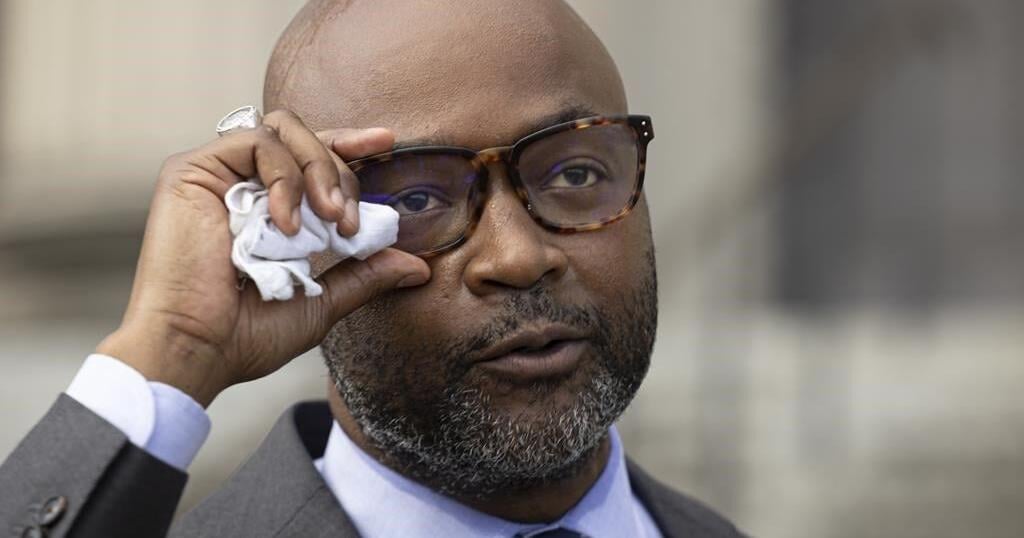NEW ORLEANS (AP) — New Orleans District Attorney Jason Williams promised to address the city’s history of prosecutorial and police misconduct when he was elected four years ago, but now he’s facing an investigation by Republican politicians who are concerned he is abusing his power.
Williams, a Black Democrat in an overwhelmingly conservative state, replaced a hard-nosed, tough-on-crime incumbent when he was elected in 2020. Since then, he’s focused on responding to what he describes as the “sins of the past” in New Orleans, and in a state which has one of the highest incarceration rates in the country. Conservative lawmakers and officials are concerned he is arbitrarily putting people convicted of violent crimes back on the streets given the state’s high homicide rates in recent years.
Over the past three years, Williams’ office reports having voided convictions or reduced sentences in several hundred cases via a process known as post-conviction relief that allows the court to consider new evidence after all other appeals have been exhausted. The landmark civil rights division of Williams’ office has reviewed old cases, leading to exonerations and plea-deal releases based on constitutional violations or legal practices his office considers unjust. Critics point out post-conviction relief was employed sparingly in the past by the district attorney’s office.
Williams has agreed to appear before a state senate committee on Sept. 5 over his office’s use of post-conviction relief.
A new law passed by a Republican-dominated Legislature earlier this year went into effect in August, effectively stripping Williams of his ability to engage in post-conviction relief without the approval of the Republican Attorney General. But state legislators had previously enacted a law in 2021 allowing district attorneys to amend sentences, even in cases without clear legal error, through post-conviction plea agreements with approval from judges.
Since 2021, Williams’ office reports as of late May having voided more than 140 convictions and reduced sentences in at least 180 cases, often re-sentencing them to lesser charges.
Conservative lawmakers have expressed concern that Williams’ office has been acting without transparency. Attorney General Liz Murrill said she is taking a “close look” at these cases and warned that convictions should not be changed “simply because the district attorney has a difference of opinion” from the courts and Legislature.
Williams is part of a wave of more than 50 progressive prosecutors who in the past decade have sought to reduce incarceration rates and review past cases where constitutional violations or excessive sentencing may have occurred. These prosecutors have more often faced blowback from ideological opponents at the state level than from the voters who elected them, typically in liberal cities with large Black populations, said Rebecca Goldstein, a law professor at the University of California, Berkeley.
The concerns raised by Louisiana officials are largely in response to a social media campaign driven by Laura Rodrigue, a former prosecutor and daughter of the previous district attorney. Her advocacy group Bayou Mama Bears has warned Williams is endangering public safety and highlighted instances where his office resentenced or released people convicted of violent crimes.
Williams has said there has been no misconduct in his office’s use of post-conviction relief and that he is simply following through on his campaign promises.
“This is not just waking up and saying, ‘Hey, let’s try something new,” Williams said. “This is listening to the community and answering and trying to deliver.”
Williams has focused in particular on reviewing non-unanimous jury convictions. A 2020 Supreme Court ruling had declared these convictions unconstitutional. While the ruling did not automatically apply retroactively, Williams has not blocked people convicted prior to 2020 by non-unanimous juries from applying for post-conviction relief on these grounds.
The state has been in the process of reckoning with law enforcement practices rooted in white supremacist history such as non-unanimous jury convictions, said Colin Reingold, legal director of New Orleans-based advocacy group Promise of Justice.
Louisiana has one of the highest incarceration rates in the country, locking up 1,067 per 100,000 of the state’s residents, according to a recent report from the Prison Policy Initiative.
“If incarceration actually provided public safety we’d be the safest place in the country, but we’re not,” said Will Snowden, a law professor at Loyola University and former New Orleans public defender.
Following the election of a Republican-dominated state government last year, Louisiana’s Legislature convened a special session on crime in February and passed new laws, including expanding methods to carry out the death penalty and eliminating parole for most people in the future.
Republican Governor Jeffy Landry has stated these laws are necessary to “deliver true justice to crime victims” and “enact real change that makes Louisiana a safer state for all.”
Williams has maintained that rebuilding trust in the criminal justice system helps increase public safety and said his office engages with victims and their families as they consider post-conviction relief cases.
Despite the ongoing clash over post-conviction relief, Williams and the Attorney General’s office have said they are working productively together in other areas such as addressing juvenile crime.
_____
This story has been updated to correct that Williams is a Democrat in a conservative state, not a district.
———-
Associated Press journalist Sara Cline in Baton Rouge contributed to this story.
___
Brook is a corps member for The Associated Press/Report for America Statehouse News Initiative. Report for America is a nonprofit national service program that places journalists in local newsrooms to report on undercovered issues. Follow Brook on the social platform X: @jack_brook96.

























